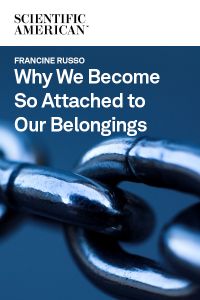Join getAbstract to access the summary!

Join getAbstract to access the summary!
Francine Russo
Why We Become So Attached to Our Belongings
Low emotional security can intensify our relationships to our belongings
Scientific American, 2018
What's inside?
Why do humans form such strong emotional attachments to objects?
Recommendation
Most people form emotional attachments to some of their possessions – be it a car, smartphone, or favorite memorabilia. Yet psychologists have only started to uncover the complex emotional processes that underlie people’s attachment to inanimate objects. Veteran journalist Francine Russo summarizes some of the most recent findings in this niche of social psychology for Scientific American. If you have ever bought something to fill an emotional void or wondered why losing a treasured object can cause such intense emotional distress, this article will provide you with some answers.
Summary
About the Author
Francine Russo is a veteran journalist, specializing in psychology and behavior. She is also a speaker and author of They’re Your Parents, Too! How Siblings Can Survive Their Parents’ Aging Without Driving Each Other Crazy.
















Comment on this summary